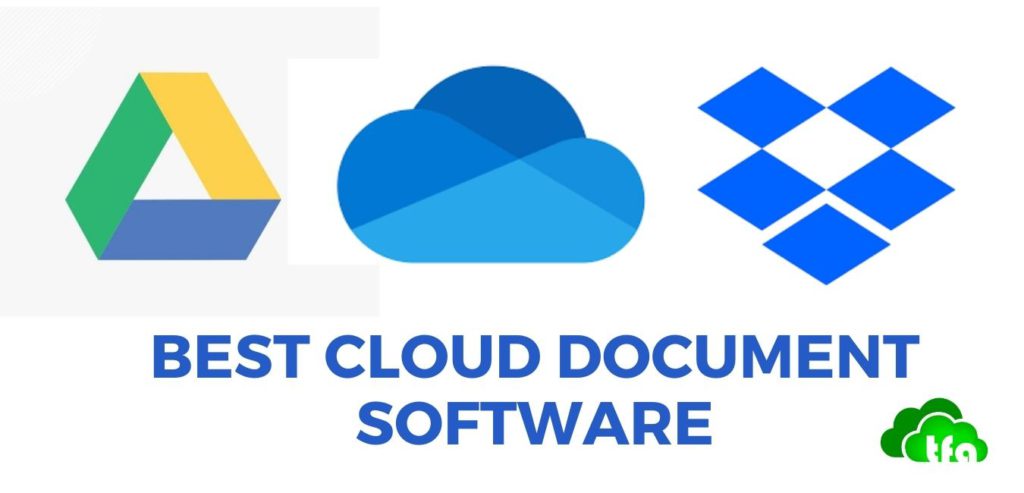In order to work uninterrupted from anywhere but still collaborate with people was an unattainable reality 10 years ago. Humans evolve and the way humans organize their working lives are changing rapidly. To be competitive and to attract the best human talent, business owners need to consider the best cloud document management software at their disposal as people’s work lives have changed enabling them to work from any destination while traveling the globe. The Best Cloud document management software must provide a secured, organized, document storage and file syncing system. Especially for those times that your laptop are ‘lost’ stolen or out-of-action
I was introduced to the cloud document management software when we performed an accounting assignment for a new client who was running multiple offices. They were in the communications industry and operated a cloud document management software system. The possibilities of working in such an environment became clear as we could observe how a sharing document system was working in practice. We were convinced that this was the way forward for our business after we considered the potential of re-engineering the manner we are structuring our daily business lives. Establishing a cloud document management software system where our entire business is connected from anywhere with ease became a priority. We already implemented an extremely well designed local server system but it was limiting us and the way we worked. Data lost, expensive time consuming backup systems and the inability to connect to the server with ease prevented the progress and growth of our business.
Before making this project a reality we had to make the most important decision: Which cloud document management software system will be the best suitable for us? The three biggest names in the business that each have earned their reputation in one way or another are Dropbox, Google Drive and OneDrive. All three provide strong platform support, device sync and file-sharing capabilities and have very good application integrations to facilitate productivity and collaboration.
Comparing the 3 giants to create a virtual server
For us the criteria for comparing the 3 giants of the cloud system were:
- Storage: Cloud storage is a model of data storage in which the digital data is stored in logical pools, the physical storage spans multiple servers, and the physical environment is typically owned and managed by a hosting company.
- Sync: Sync refers to the ability to make a change to a file on one device and see that change reflected on another device without having to manually transfer the file yourself; ideally, in real-time. While the basic approach to sync is the same from one service to another, the services that do it best, provide broader platform support, move files faster and include options like throttling and selective sync. Selective sync lets you turn off sync for specific files so that they don’t take up space on your hard drive.
- File sharing: File sharing is one of the key attributes that define cloud storage services. Very few cloud storage services today only provide storage.
- Application integrations: integrations enhance workflow and collaborations. The ability to share content results in online collaborations. That ability isn’t all that matters, though. Content control is critical, too. Content-control, mean features that restrict unauthorized file access when sharing. Examples include setting permissions and password-protected links.
- Security: Cloud computing security or, more simply, cloud security refers to a broad set of policies, technologies, and controls deployed to protect data, applications, and the associated infrastructure of cloud computing.
1. Storage and pricing
- Free signup – 15 GB of free storage to use across Google Drive, Gmail, and Google Photos.
- Google One – Your storage is increased to 100GB when you upgrade to Google One.
- G Suite Basic – $6 pm for 30GB
- G Suite Business – $12 pm for unlimited cloud storage (1TB per user if less than 5 users)
- G Suite Enterprise – $25 pm for unlimited cloud storage (1TB per user if less than 5 users)
- Free signup – 5 GB of storage. Office apps not included.
- OneDrive 100G – $1.99 pm for 100GB. Office apps not included.
- Microsoft Personal (Home) – 69.99 per year of $6.99 pm for 1TB (1000 GB). Office apps are included
- Microsoft 365 Family – $99.99 per year or 9.99 pm for 6TB (1000 GB) per person. Office app are inlcuded.
For Business
- OneDrive for Business Plan 1 – $5 pm 1TB. Office apps not included.
- OneDrive for Business Plan 2 – $10 pm Unlimited storage. Office apps not included (Advanced security)
- MS 365 Business basic – $5 pm 1TB. MS Exhange, Sharepoint & MS teams inlcuded.
- MS 365 Business Standard – $12.5, Unlimited storage MS Office apps are included.
- Free – 2GB pm.
- Plus for individuals – $9.99 pm, 2TB (2000 GB).
- Profesional for solo workers – $16.58 pm, 3TB (3000 GB)
2. Sync
All 3 has extremely good syncing capabilities. While Dropbox lagged behind Google Drive and OneDrive when it came to initial file uploads, those results are likely to be variable depending on where you’re located. Dropbox has an advantage with syncing changes to files already uploaded to the cloud.
It is advocated that the One Drive’s syncing facility works well, in our opinion it is more complicated to set-up and we had an average experience with the syncing facility. Definitely not one of One Drive’s strong features.
Google’s file sharing set-up is relatively simple yet it can have a negative impact on your PC’s performance if too many files are shared but it works very well with no data lost or corrupted.
3. File Sharing
Dropbox, Google Drive and OneDrive users can share files and folders from their desktop client, mobile app or browser interface. Options include sharing by email or generating a link that anybody can use. OneDrive offers also media-playing and device syncing.
4. Application Integrations
Dropbox, Google Drive and OneDrive have application integrations.
Google has developed its own suite of office apps, which are completely free and available with Google Drive. These apps include:
- Docs: for word processing and web publishing
- Sheets: for spreadsheets and charts
- Slides: for presentations
- Forms: for surveys and data acquisition
- Drawings: for diagrams
Collectively, the suite is called Google Suite and it is completely browser-based and Google Drive integrates with many more third-party apps.
Office Online comes already integrated into OneDrive without you having to do anything. This integration includes Word, Excel, Powerpoint and OneNote.
5. Security
All 3 cloud-based services such as Dropbox, OneDrive and Google Drive employ server-side encryption. This means that any data you store on their servers is encrypted using a master key to which the server administrators have access. While most cloud storage data centers offer ample security, Google seems to go above and beyond with the measures it has in place, including laser grids and biometric scanners. Granted, those measures are there to protect Google’s own vast and valuable data stores; your cloud data piggyback on Google’s security functions.
Dropbox was subject to a high-profile 2012 hack that saw 68-million usernames and passwords stolen. However, Dropbox has learned from that event and taken appropriate measures to protect user data, including hashing and salting user passwords. OneDrive doesn’t encrypt at-rest data.
Conclusion
The Google Business Suite provides the advantage of the integration of all Google applications. We experienced a smooth uninterrupted cloud document management software system backed up by an efficient support team. Google Drive enabled my business to have a virtual server and to go paperless.
This article is based on my own unique investigation and experience. The reader should perform his/her own due diligence investigation before deciding on the most appropriate cloud document management software system for his business.
















